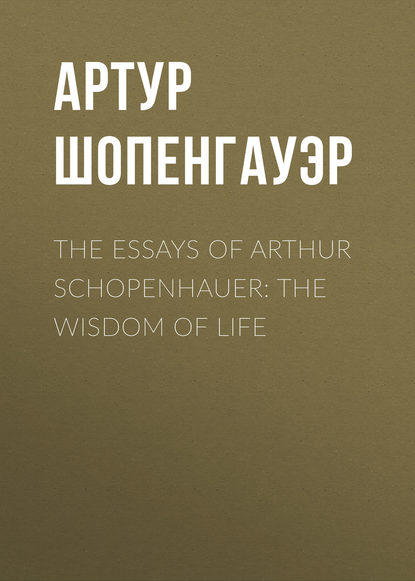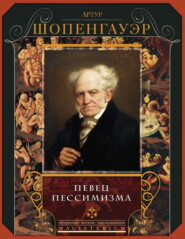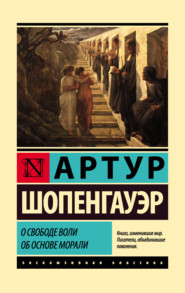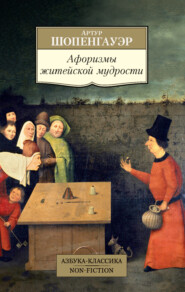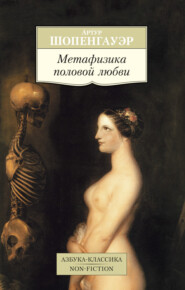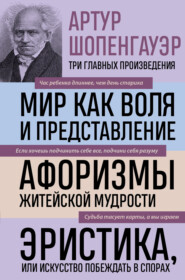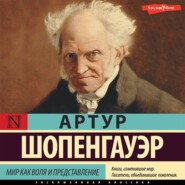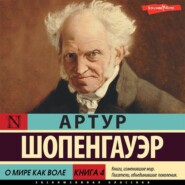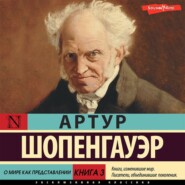По всем вопросам обращайтесь на: info@litportal.ru
(©) 2003-2024.
✖
The Essays of Arthur Schopenhauer: the Wisdom of Life
Настройки чтения
Размер шрифта
Высота строк
Поля
41
Heroditus, i. 199.
42
De Constantia, 11.
43
De Constantia, 11.
44
Translator's Note. – It is true that this expression has another special meaning in the technical terminology of Chivalry, but it is the nearest English equivalent which I can find for the German —ein Bescholtener
45
Translator's Note. It must be remembered that Schopenhauer is here describing, or perhaps caricaturing the manners and customs of the German aristocracy of half a century ago. Now, of course, nous avons change tout cela
46
Translator's Note. These and other remarks on dueling will no doubt wear a belated look to English readers; but they are hardly yet antiquated for most parts of the Continent.
47
litteraires: par C. Durand. Rouen, 1828.
48
Bk. IX.
49
Diogenes Laertius, ii., 21.
50
Ibid 36.
51
Diogenes Laertius, vi. 87, and Apul: Flor: p. 126.
52
Cf. Casaubon's Note, Diog. Laert., vi. 33.
53
Translator's Note. The story to which Schopenhauer here refers is briefly as follows: Two gentlemen, one of whom was named Desglands, were paying court to the same lady. As they sat at table side by side, with the lady opposite, Desglands did his best to charm her with his conversation; but she pretended not to hear him, and kept looking at his rival. In the agony of jealousy, Desglands, as he was holding a fresh egg in his hand, involuntarily crushed it; the shell broke, and its contents bespattered his rival's face. Seeing him raise his hand, Desglands seized it and whispered: Sir, I take it as given. The next day Desglands appeared with a large piece of black sticking-plaster upon his right cheek. In the duel which followed, Desglands severely wounded his rival; upon which he reduced the size of the plaster. When his rival recovered, they had another duel; Desglands drew blood again, and again made his plaster a little smaller; and so on for five or six times. After every duel Desglands' plaster grew less and less, until at last his rival.
54
Knightly honor is the child of pride and folly, and it is needy not pride, which is the heritage of the human race. It is a very remarkable fact that this extreme form of pride should be found exclusively amongst the adherents of the religion which teaches the deepest humility. Still, this pride must not be put down to religion, but, rather, to the feudal system, which made every nobleman a petty sovereign who recognized no human judge, and learned to regard his person as sacred and inviolable, and any attack upon it, or any blow or insulting word, as an offence punishable with death. The principle of knightly honor and of the duel were at first confined to the nobles, and, later on, also to officers in the army, who, enjoying a kind of off-and-on relationship with the upper classes, though they were never incorporated with them, were anxious not to be behind them. It is true that duels were the product of the old ordeals; but the latter are not the foundation, but rather the consequence and application of the principle of honor: the man who recognized no human judge appealed to the divine. Ordeals, however, are not peculiar to Christendom: they may be found in great force among the Hindoos, especially of ancient times; and there are traces of them even now.
55
Ritterhetze
56
Accordingly it is a poor compliment, though sometimes a fashionable one, to try to pay honor to a work by calling it an action. For a work is something essentially higher in its nature. An action is always something based on motive, and, therefore, fragmentary and fleeting – a part, in fact, of that Will which is the universal and original element in the constitution of the world. But a great and beautiful work has a permanent character, as being of universal significance, and sprung from the Intellect, which rises, like a perfume, above the faults and follies of the world of Will.
The fame of a great action has this advantage, that it generally starts with a loud explosion; so loud, indeed, as to be heard all over Europe: whereas the fame of a great work is slow and gradual in its beginnings; the noise it makes is at first slight, but it goes on growing greater, until at last, after a hundred years perhaps, it attains its full force; but then it remains, because the works remain, for thousands of years. But in the other case, when the first explosion is over, the noise it makes grows less and less, and is heard by fewer and fewer persons; until it ends by the action having only a shadowy existence in the pages of history.
57
Ecclesiasticus, xxii., 8.
58
Act iv., Sc. 2.
59
Our greatest pleasure consists in being admired; but those who admire us, even if they have every reason to do so, are slow to express their sentiments. Hence he is the happiest man who, no matter how, manages sincerely to admire himself – so long as other people leave him alone.
60
Milton. Lycidas.
61
Epist. I. II.





